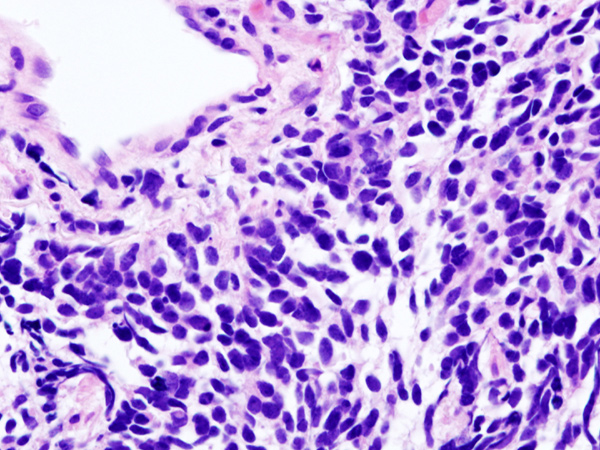Combining Immunotherapy and Chemotherapy for Lung Cancer
Adding the immunotherapeutic atezolizumab to standard chemotherapy improved overall survival for patients with extensive-stage small-cell lung cancer.

The U.S. Food and Drug Administration (FDA) recently approved expanding the use of atezolizumab (Tecentriq), a type of immunotherapeutic called a checkpoint inhibitor, to include its use in combination with the cytotoxic chemotherapeutics carboplatin and etoposide for the initial treatment of adults diagnosed with extensive-stage small-cell lung cancer (SCLC).
SCLC accounts for about 15 percent of the lung cancer cases diagnosed in the United States, according to the National Cancer Institute (NCI). This translates to about 34,000 new cases of the disease each year. Unfortunately, most patients (70 percent) are diagnosed with extensive-stage disease, which means the cancer has spread beyond the lung, or the area between the lungs or the lymph nodes above the collarbone to other parts of the body.
Little progress has been made against extensive-stage SCLC over the past two decades. Standard treatment includes combination cytotoxic chemotherapy, most commonly a two-agent combination of a platinum-based chemotherapeutic, either cisplatin or carboplatin, together with etoposide. Even with such treatment, median survival for patients diagnosed with extensive-stage SCLC is just six to 12 months, according to the NCI.
Atezolizumab works by releasing a brake called PD-1 on natural cancer-fighting immune cells called T cells. The rationale for adding atezolizumab to standard combination chemotherapy for extensive-stage SCLC was that the disease is characterized by a high mutation rate. Cancers with high mutation rates typically trigger anticancer T cells and can be responsive to immunotherapeutics that release T-cell brakes.
The approval of atezolizumab in combination with carboplatin and etoposide for the treatment of extensive-stage SCLC was based on results from the randomized, phase III IMPower133 clinical trial. The results, which were published in the New England Journal of Medicine, showed that among the 201 patients with previously untreated extensive-stage SLCLC who received atezolizumab, carboplatin, and etoposide, the median overall survival was 12.3 months. The median overall survival was significantly less, 10.3 months, among the 202 patients who received placebo, carboplatin, and etoposide.
Before this approval for extensive-stage SLCLC, atezolizumab was approved for treating certain patients with bladder cancer in May 2016, for treating certain patients with non-small cell lung cancer in October 2016, and for treating certain patients with triple-negative breast cancer in March 2019.
The FDA approval was rendered on March 18, 2019.
